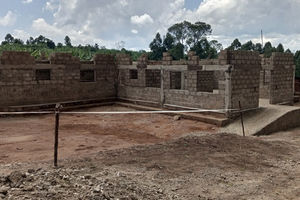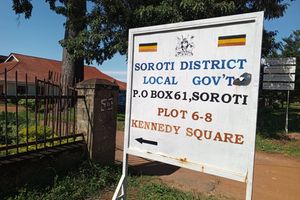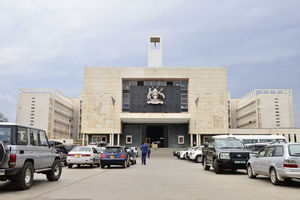
A lady guides traffic on Lira-Kamdini road during its construction in 2022.Despite the poor infrastructure countrywide, many districts fail to utilise and return huge sums of money to the Treasury. PHOTO | FILE
Despite the poor infrastructure countrywide, marked by potholes and slippery roads, broken-down schools and health centres, still many districts failed to utilise and returned huge sums of money to the Treasury.
In Kyenjojo District, Mr Richard Rubaihayo, the district chairperson, said the money earmarked for the Uganda Intergovernmental Fiscal Transfers Programme Projects (UgIFT) that involved hybrid procurement, was returned in June at the close of the 2023/2024 financial year.
He said the affected projects include the construction of Kigarare Seed School, budgeted at Shs2.2 billion, from which about Shs500 million was returned to the Consolidated Fund. He, however, said despite the setback, the construction is nearing completion, with the contractor expected to hand over the school by the end of this year, ahead of the originally scheduled completion date of April next year.
Another project affected is the construction of Kyarusozi Seed School, budgeted at Shs2.7 billion, with approximately Shs1.6 billion returned due to delayed commencement of the works in May. The contractor is now anticipated to complete the work by May next year.
Nevertheless, Mr Rubaihayo is optimistic that the project funds will soon be returned to the districts before the end of the first quarter of this financial year.
“These funds were indeed returned to the Treasury, but we expect to receive them in the first quarter of the 2024/2025 financial year. We want to thank Parliament for passing the resolution that ensures funds meant for specific projects, when returned, should be reallocated immediately. In previous financial years, we suffered because the money would only be returned at the end of another financial year," Mr Rubaihayo explained.
Bunyangabu District
In Bunyangabu District, the district chairperson, Mr James Ategeka, said approximately Shs3 billion was returned to the centre. The money had been earmarked for the construction of Nsura and Katugunda Seed schools, and the upgrade of Katweebwa Health Centre II to health centre III status.
In Masindi, some Shs6.2 billion was wired back to the Treasury due to failure by the district to absorb funds meant for projects and salaries.
Last year, the district’s unspent balance was Shs2.86 billion.
The outgoing district Chief Administrative Officer, Ms Phiona Sanyu, said the funds were returned because of delays and irregularities in the procurement process.
Mr Brian Atuhuura, the district’s communications officer, clarified that most of the funds were allocated to projects such as the construction of seed schools and unpaid gratuities.
The funds returned include Shs1.6 billion for the construction of Kijunjubwa Seed Secondary School, Shs946 million for St Andrea Kaawa Secondary School in Labongo Sub-county, Shs526.6 million for Kinumi Seed School in Mirya Sub-county, and Shs174.3 million for St Paul’s Pakanyi Seed Secondary School.
Another Shs126 million intended for gratuity, and Shs2.6 billion for staff salaries was also returned to the national coffers.
“The recruitment of staff was not carried out due to the existing recruitment ban and non-functionality of the district service commission. As a result of the returned funds, the construction of the affected projects stalled until the funds are reallocated,” Mr Atuhuura said.
“The district has successfully coordinated with the Ministry of Finance and the Treasury to ensure these crucial funds are returned within the current financial year. The reallocation of these funds is expected to provide a much-needed boost to local projects stalled due to financial constraints,” he added.
In Iganga District, the district chairperson, Mr Ezra Gabula, said they have been returning money for the small-scale irrigation project to the Treasury for three financial years because of the “tough conditions” attached to it.
“Farmers have failed to use Shs1b because of the percentage they have to pay to receive it. If they give a farmer Shs18m, he has to contribute Shs4m,’’ he said.
“Last financial year, we received Shs1b and only used 47 percent (Shs470m) and returned the rest (Shs530m) to the Treasury. We don’t achieve the 100 percent utilisation of the irrigation funds in every financial year,” he added.
Mr Gabula also said awarding the Uganda People’s Defence Forces (UPDF) the tender to manage the irrigation projects also delays their implementation because it has several other projects to implement.
In Jinja City, mayor Peter Okocha Kasolo said his council was able to utilise all the money sent by the government because it came on time.
Mr Kasolo said unlike other local governments, Jinja City did not return any money to the national Treasury because his technical team submitted their work plans on time.
“Politicians and my technocrats are organised; therefore, we are able to send the work plans for funding to the central government on time, meaning the release also comes early enough, thus creating no room for unused money to be returned,” he said.
He criticised Local Governments that claim the government delays to release money for projects, saying such entities also delay to submit their work plans.
Both Soroti and Serere districts failed to utilise more than Shs800m.
Mr Andrew Ocen, the district chief administrative officer, said a mix-up in documentation left Shs419m meant for the Tubur Sub-county low-cost seal tarmac unutilised.
“There was a contradiction between what was signed in the agreement and what was prepared," Mr Ocen said.
He said the agreement was to work on 0.9km and instead the contractor focused on only 0.5km, which he said was in breach of the agreement.
In Serere District, Shs400m meant for micro-scale irrigation was not utilised.
The government, through the World Bank, has been supporting farmers across many districts in the country to help them upgrade from subsistence farming to commercial farming through small-scale irrigation systems.
Mr Robert Ogarima, the assistant water engineer of Serere District, said Shs400m was returned because the farmers in the district failed to absorb the money.
Mr Eric Sunday, the Kabale deputy town clerk, said Shs4.766 billion meant to fund different projects in Kabale Town was returned to the national Treasury.
Mr Sunday said these funds include Shs3.058 billion budgeted to facilitate the rehabilitation of Kigezi College Butobere, and another Shs1.708 billion for Uganda Support to Municipal Infrastructure Development (USMID) projects in Kabale Town.
“We have written to the Ministry of Finance for the release of these funds so that the implementation of the targeted projects kicks off.
The Ministry of Finance stopped us from implementing the Kigezi College Butobere rehabilitation project, while the USMID funds were returned to the centre because the contractors had not completed the work,” he said.
The Kanungu District Council speaker, Mr Frank Byaruhanga, revealed that about Shs1.120 billion was returned to the national Treasury, although they managed to utilise at least 97.9 percent of funds in the financial year.
“The money returned to the centre included Shs193m for development programmes, which the contractor had not completed; Shs270m unpaid pension for retired district employees; Shs656m meant for unpaid wages, and Shs140,000 for none wage priority areas,” Mr Byaruhanga explained.
Mr Gideon Tumwesigire, the Rukiga District principal assistant secretary, said Shs2.2b, which was supposed to be used to pay wages, pension and gratuity, was returned due to the existing recruitment ban imposed by the Ministry of Public Service.
Mr Gilbert Olanya, the MP for Kilak South in Amuru District, also the chairperson of the Public Accounts Committee of Parliament (Local
Government), said following numerous concerns raised by local governments about the huge sums of money being returned to the Treasury, they have directed the Office of the Auditor General to thoroughly investigate a syndicated move by the Ministry of Finance and Public Service officials to swindle public funds.
He said their findings indicate that there seems to be some syndicate that the Ministry of Finance and the Public Service is playing with the taxpayers’ money.
The money is reportedly sent towards the end of the financial year, with no clear guidelines and without a request for a supplementary budget from the respective areas.
“From our findings, we discovered there is some syndicate that the ministries of Finance and that of Public Service are playing with public funds. For example, they normally send money to the districts towards the end of the financial year, and from our engagement, we discovered that all the districts are sending back huge amounts of money to the central government at the end of the financial year,” Mr Olanya said.
Mr Jim Mugunga, the spokesperson of the Ministry of Finance, said: "Sending the money back to the Consolidated Fund means those funds have been marked for the end of a financial year. So, we are going to appropriate afresh according to the submissions [done by local governments] for the subsequent financial year.”
“I advise them to ensure their submissions are done on time to avoid such delays because even if a requisition is submitted late, we send the money with an anticipation that a district has the capacity and is ready to absorb money within that limited time,” he added.
Northern districts fail to spend
Parliament’s Public Accounts Committee (Local Government) said Lira City alone sent back around Shs9b, Gulu City Shs5), and Apac Shs7b, among other areas.
“In fact, in all these districts, there is huge amounts of money that is going back to the central government. This is an indication that some cliques are trying to swindle some money, and if you ask why it is being returned at the end of the financial year, no one will account for that,’’ Mr Olanya noted.
Mr Onyertho Obonyo, a committee member, said they discovered that all the entities have challenges with staffing, with some of them functioning at less than 50 percent capacity.
“We discovered that more than half of the money that is sent back to the Treasury is meant to recruit staff,” he said.
Mr Innocent Ahimbisibwe, the Gulu City Town Clerk, admitted that the city returned more than Shs5 billion to the Treasury after it failed to absorb it.
“There were funds that came to our account late and we could not absorb them, there were also funds that the Finance ministry sent to us even when we did not request for them. Even if we had areas to deploy the funds, the financial year was just closing and we could not use it,” Mr Ahimbisibwe said.
In Kole District, Mr Denis Obol, a district councillor, said their district returned Shs500m to the Consolidated Fund. The money was meant for a micro-irrigation project.
“The district returned that money because farmers didn’t show interest in utilising it because they could not afford to co-fund it,” he says.
In the island district of Buvuma, Mr Adrian Wasswa Ndungu, the district chairperson, said Shs600m meant for recruitment of new teachers was returned to the central government.
“The Public Service ministry did not okay the recruitment of teachers, so keeping the money on our account was risky,” he said.
Mr Michael Kanaku, the Buyende District chairperson, said they have returned Shs541m out of the Shs860m meant for a micro-irrigation project scheme for the farmers in the districts.
“Our assessment revealed that 90 percent of our farmers cannot meet the set requirements,” he said.
Mpigi, Dokolo get innovative
In Mpigi, the deputy district chairperson, Ms Aisha Nakirija, said they were able to utilise all the budgeted funds and some projects are still ongoing.
"We were able to absorb our budget this time round and want to assure our people that every penny was accounted for,” she said.
This scenario also played out in some districts in the Lango Sub-region.
A source in Dokolo District said the district leadership worked hard to ensure all the projects were awarded to contractors and when the financial year came to an end, the allocated money was withdrawn from the district accounts and given to the contractors before they could complete the projects.
"…the balance was not returned but given to the contractor and right now, work is ongoing using the money for the last financial year," he said.
The Apac District secretary for health and education, Mr Sam Opira, said before the financial year ended, Apac District had already utilised all the funds it received from the central government.
Similarly, the Masaka city speaker, Mr Achilles Mawanda, said the funds the city received were all utilised and nothing was returned to the Consolidated Funds this financial year."The most outstanding thing last financial year is that we kicked off the long-awaited project of reconstructing Masaka Recreation Grounds, and completion of city roads, among other projects, where funds were spent," he said.
By Al-Mahdi Ssenkabirwa, Philip Wafula, Abubaker Kirunda, Tausi Nakato, Alex Ashaba, Brian Kesiime, Ismail Bategeka, Susan Nanjala, Antonio Kalyango, Simon P Emwamu, Bill Oketch, Robert Muhereza, Emmanuel Arineitwe, Julius Hafasha, Tobbias Jolly Owiny, Emmy Daniel Ojara, Scovin Iceta, Malik F Jjingo, Clement Aluma & Bill Oketch.




